Northern and arctic societies. Рубрика в журнале - Arctic and North
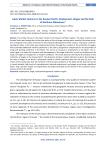
Labor Market Features in the Russian North: Employment, Wages and the Role of Northern Allowances
Статья научная
This article focuses on the labor market in the Russian northern regions. The labor market in the Russian North was formed due to the state policy of the no longer existing state, aimed at the active attraction of migrants from other territories for the industrial development of the country. This policy of attracting migrant labor in the state was implemented mainly through the creation of the institution of wages, which provided additional northern payments to the salary, designed to compensate for the discomfort of living and working conditions in the North. This led to an increase in employment in the North. The research goal is to study the formation and development of the wage institution, as well as to determine the impact of wages on employment in modern conditions. The article presents the history of formation of the institution of wages in the Russian North. The dynamics of labour market indicators is given, the change in the ratio of wages in the North is presented, based on official statistical data over the past 15 years. The results of the study show that the northern territories have problems of the labor market that have arisen in recent decades: high levels of unemployment, reduced employment, and wages, once being a significant factor, had a positive impact on employment, but today contribute to the decline in the economic attractiveness of life in the North.
Бесплатно
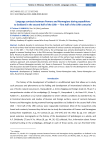
Статья научная
Svalbard, despite its remoteness from the mainland and traditional routes of communication, is an Arctic territory that has been attracting the attention of various countries and peoples for several centuries. In the 18th - first half of the 19th century, the archipelago was actively developed by Pomors, engaged in mammal hunting there. In the 19th century, Norwegians revealed their economic interest in Svalbard. Historical studies have repeatedly examined the cases of contacts between Pomors and Norwegians during mammal hunting expeditions to Svalbard, but none of the authors have studied the language contacts between Pomors and Norwegians during the development of Svalbard. The authors used an interdisciplinary approach and analyzed documentary and literary sources to formulate a hypothesis about the practice of Pomor-Norwegian contacts, incl. those in Russenorsk. The study presents a new issue for scientific discussions by both historians and linguists, which can serve as a basis for the development of international cooperation between Norway and Russia.
Бесплатно
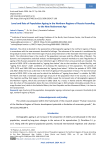
Статья научная
The article is devoted to the peculiarities of demographic ageing in the northern regions of Russia in accordance with the new economic threshold of old age. The relevance of the research is conditioned by the gradual increase of the retirement age in Russia and preservation of the favorable retirement age in the North. The information base is the results of the population censuses and the official data of Rosstat. The dynamic and comparative statistical analysis and demographic research methods are used. Regularities of ageing of the Russian population by new retirement age in different inter-census periods are revealed. The period of 1959-1970 is characterized by “ageing from below” due to the transition to limited fertility, and “ageing from above” under conditions of increasing life expectancy of the population. The periods of 1970-1979 and 1989-2002 are characterized by “ageing from below”. Within the periods of 1979-1989 and 2002-2010, there was a decrease in the level of ageing of the population in Russia. The last intercensal period of 2010-2021 is the only one for which the definition of “ageing from above” is suitable. By 1989, the North zone had a noticeably younger age structure of the population than in the country as a whole. The migration outflow that began in the late 1980s caused the increased rates of demographic ageing of the Northern regions, which also continued in 2002-2010. As a result, in Karelia and the Arkhangelsk Oblast, the share of the population above the new retirement age in 2021 already noticeably exceeds the average Russian level, while in the Sakhalin Oblast, the Komi Republic and the Murmansk Oblast, it is close to the national level.
Бесплатно
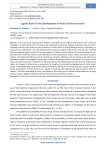
Logistic Basis for the Development of Arctic Tourism in Russia
Статья научная
In our article we analyzed the transport accessibility of the subjects of the Arctic zone of Russian Federation for potential tourists. To do this, we estimated in points the material and time costs of tourists, traveling from the main centers of the formation of tourist flows in Russia (Moscow and St. Petersburg) to various Arctic destinations. For each administrative-territorial subject of the Arctic zone we have selected potential support logistic centers of the development of Arctic tourism, which will receive visiting tourists, provides them with basic services and redistributes them along tourist routes. These are mainly transport centers, connected with Moscow and St. Petersburg and with settlements on this territory. We referred to Murmansk, Apatity, Arkhangelsk, Naryan-Mar, Vorkuta, Salekhard, Norilsk, and Anadyr. As a result of the study, we have found that currently the most promising for the development of Arctic tourism is Murmansk region, its transport infrastructure is convenient for using by tourists and the development of Arctic tourist routes. Arkhangelsk Oblast and Yamalo-Nenets Autonomus Okrug are also promising, their support centers of the development of Arctic tourism are capable of receiving and redistributing tourist flows in Arctic directions. The least developed in terms of transport is the Arctic part of Yakutia, where there are no large transport hubs, capable of taking on the function of tourist distribution centers.
Бесплатно
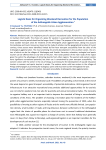
Статья научная
Weekend rest is an important part of a person's recreational cycle. Northerners need a good rest to maintain their health. The choice of a place for vacation is associated with restrictions on the time of movement, since its period should not be longer than 2–3 days. The purpose of the research is to select the most suitable transport areas for residents of the Arkhangelsk urban agglomeration, taking into account the landscape and tourist resources. Based on the study of vehicles and the geographical location of tourist services, three sectors were identified, limited by five–hour transport accessibility from the cities of the Arkhangelsk agglomeration. The most promising for priority development is the southern sector, the centers of which can be the villages of Kholmogory and Emetsk. Excursion, relaxation, ecological and sports tourism can be offered there at any time of the year. The transit position of the main roads of the region gives this sector the advantages of attracting tourists from other regions. The western and eastern sectors have significant recreational potential, but their use is constrained by poor transport accessibility. The western sector with the center in the city of Onega is promising for the development of seaside relaxation tourism in summer and sports tourism in winter. The eastern sector with two centers in the villages of Pinega and Karpogory is promising for ecological, sports and excursion tourism throughout the year.
Бесплатно
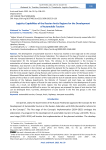
Logistics Capabilities of the Russian Arctic Regions for the Development of Automobile Tourism
Статья научная
The development of automobile tourism in Russia has reached a new stage due to the concept approved by the Government of the Russian Federation. The relevance of this type of tourism is associated with the increased demand of Russians for travel within the country and the difficulties in providing of transportation for the increased tourist flows. The stimulus to its development is the increase in motorization of citizens and the great recreational potential of Russia. For the Arctic Zone of the Russian Federation, auto tourism is one of the ways to develop the territory. In our work, based on the analysis of reviews of auto tourists in the Internet, we studied the demand for the regions of the Russian Arctic, the directions of the main car routes, the impressions gained from travelling on the Arctic roads. It turned out that the most popular regions among Russian auto tourists are the western sector of the Russian Arctic — Murmansk Oblast and the Republic of Karelia. Most trips are made in warm season. Tourists note the poor quality of the surface on some sections of the roads and the lack of roadside service facilities. Based on the materials of the highway departments, the Ministry of Transport and road maps, we studied the accessibility of the Arctic regions of Russia for auto tourists, their suitability for the development of tourist routes. As a result, we divided the Arctic regions into four groups: the most accessible, accessible, conditionally accessible and difficult to access. For each group, we proposed the types of auto tourism that can be developed there. Currently, development of auto tourism in the first two groups is the most promising.
Бесплатно
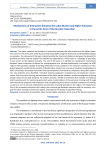
Статья научная
This paper examines the problem of interaction between the labor market and the higher education system in the Arctic Zone of the Russian Federation (AZRF) using the Murmansk and Arkhangelsk Oblasts as examples. The relevance of the topic is determined by the structural imbalances between the demand for qualified personnel and the supply from educational organizations, which leads to a shortage of specialists in key sectors of the regional economy. The aim of the work is to identify key coordination mechanisms between these institutions to reduce the unemployment rate, increase employment, and supply the AZRF regions with specialists capable of working effectively in Arctic conditions. The research is based on an integrated approach, combining the analysis of Rosstat data, results from a survey of students and graduates of AZRF universities, and expert interviews with representatives of universities, employers, and public authorities. Key problems were identified: mismatch between graduates’ competencies and employers’ requirements, lack of practical training, low awareness of the labor market situation, and the outmigration of young people. Based on the data obtained, the authors propose a model of interaction that includes an analytical and forecasting unit for monitoring personnel needs, modernization of the personnel training unit through joint educational programs with employers and strengthening the practice-oriented component of training, as well as a unit to promote employment and retention of young specialists in the region. The implementation of the proposed mechanism will reduce the structural gap between education and the economy, mitigate the labor shortage in the Arctic regions, and improve the quality of specialist training.
Бесплатно
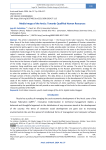
Media Image of the Arctic: Towards Qualified Human Resources
Статья научная
The article is devoted to the relevant topic — the Russian Arctic labor resources. The potential labor force of the Arctic today includes representatives of generation Z, graduates of Russian universities. The strategic issue of attracting labor resources to the Arctic has a target audience of young people. The governmental policy agent is mass media. The media provide public narratives of social constructs. The media are used to represent such an important social construct for the state as the Russian Arctic. The established media image of the Arctic includes characteristics related to the harsh weather conditions, the region’s resource endowment, its military potential, and environmental problems. The traditional components of the media image of the Arctic have little significance in terms of highlighting the region’s human resource potential. The existing media image of the Arctic is uninformative for potential Arctic labor force due to the features of public information consumption and processing by young people. The content of the media image has a specific pragmatic component that is directly related to the issue of labor vacancies, living conditions, work and lifestyle in the location of the vacancy. The aim of the study is to determine the media image of the Arctic corresponding to the Russian government’s strategy for the development of the area. As a result, recommendations are made to adjust the media image of the Arctic to solve the problem of staffing the Arctic. The scientific novelty of the study is in the data obtained through surveys of Arctic university students. This data allows us to assess the degree of young people’s awareness of the possibilities for applying professional competencies in the development of the Arctic. The study of the modern youth features, including the character of media consumption, also constitutes scientific novelty in the study of tools for the formation of Arctic workforce. Practical significance is represented by the possibilities that will provide a new media image of the Arctic for the creation of human resources potential of the AZRF.
Бесплатно
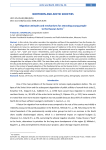
Migration attitudes and mechanisms for attracting young people to the Russian Arctic
Статья научная
In this article, the author considers the migration outflow of the population from the Russian Arctic, a significant part of which are representatives of the socially active youth. A study of young people's motivations to move to a permanent or temporary place of residence in the Arctic showed that the idea of a region dominates the consciousness of this social group, characterized more by negative associations, such as “ice”, “cold” and “snow”. Nevertheless, some specific material incentives that, according to respondents, would positively influence a possible decision to relocate revealed. We are talking about providing additional paid vacations and rental housing. It was also possible to establish approximate boundaries of the minimum wage enough to decide on moving. The author claims that the socio-economic conditions changed after the collapse of the USSR. The state labor policy in the Arctic requires clarification concerning the discussed development options. Also, it demands the coherence of all measures taken at the legislative level in the context of speedy adoption of the fundamental law on the Russian Arctic. It is necessary to continue the policy of supporting various volunteer organizations as the most active and mobile structures for informing young people about employment opportunities in the Arctic and involving their representatives in socially useful activities.
Бесплатно
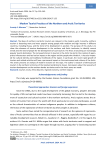
Modern Tourist Practices of the Northern and Arctic Territories
Статья научная
The ideas of northern and Arctic tourism are relevant in the modern world. Currently, northern tourism is becoming more and more popular among people with medium and high incomes in different countries, including Russia, and the trend of its development is positive. The purpose of this study is to show the relevance of tourism development in the northern and Arctic territories, to identify current trends and the need of people for the development of such tourism. The Arctic is becoming an increasingly popular tourist destination. The increased interest in tourism in the Arctic has led to the creation of appropriate infrastructure and has had an impact on the region and the people who inhabit it. It has also impacted the cultural identity and traditional livelihoods of the region. In particular, the recent rapid growth of tourism and related activities will have a permanent impact on the environment and cultures of the Arctic. The article presents an analysis of modern research on this topic. The author’s research of ethnocultural tourism in the northern territories of the Karelian borderland is shown. Conclusions about the necessity of tourism development on the northern border territories and in the Arctic zones are made.
Бесплатно
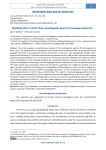
Multilingualism in Arctic Cities: Sociolinguistic Aspects of Language Interaction
Статья научная
The article provides a comprehensive analysis of the sociolinguistic aspects of multilingualism in Arctic cities. The research aims to systematize and critically examine existing studies on the peculiarities of language interaction in the context of intensive urbanization in the Arctic. The methodology includes a qualitative content analysis of 74 Russian and international publications from 1980 to 2024, selected from leading scientific literature databases. As a result, key areas of research have been identified: the impact of urbanization and migration on the language situation, the relationship between language and identity, the visual presence of languages in urban space, and the language initiatives and practices of various population groups. The study reveals that urbanization poses risks of linguistic assimilation for indigenous peoples, but also opens up opportunities for revitalizing minority languages and developing new forms of cultural expression. The common patterns and local specifics of language interaction, as well as the factors of preserving and losing linguistic diversity in Arctic cities, are determined. The need for a balanced language policy and planning to support multilingualism as a key component of sustainable development in the Arctic region is substantiated. Prospects for further interdisciplinary research are outlined, considering the dynamic nature of sociolinguistic processes in the Arctic. The results make a significant contribution to the development of Arctic sociolinguistics and can be used to develop evidence-based language policies and planning measures in the circumpolar region.
Бесплатно
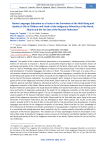
Статья научная
The quality of life is determined by approaches to its assessment, including analysis of the effectiveness of measures to improve it. Russia has accumulated empirical data on socio-economic factors of well-being and quality of life of the indigenous minorities of the North, Siberia and the Far East, however, there is a lack of knowledge about the degree of influence of educational policy in the field of preservation and development of national languages and culture on them. The purpose of the work is to assess the social situation related to the availability of education in the native language as a condition for the formation of well-being and quality of life of children and youth of the indigenous minorities of the North, Siberia and the Far East of the Russian Federation. The study included 2 parts: analysis of macro-level indicators of the quality of life of the indigenous minorities of the North, Siberia and the Far East based on data from ethnic statistics, general statistical indicators, educational statistics; a survey study in which young people of the indigenous minorities of the North, Siberia and the Far East of the Russian Federation from 8 regions of the Russian Federation participated. The study obtained reliable and representative data on the learning conditions and factors of subjective well-being of the youth of the indigenous minorities of the North, Siberia and the Far East living in different regions. The use of comparable indicators to assess the social situation in several subjects of the Russian Federation makes it possible to correctly compare the quality of life of the youth of the indigenous minorities of the North, Siberia and the Far East with their peers living in the same territories of the Russian Federation, but not belonging to these ethnic groups. The results of the study made it possible to fill in the lack of data on the potential for the preservation and development of native languages and cultures of the indigenous minorities of the North, Siberia and the Far East. Knowledge of the mechanisms of formation of attitudes and behavior of young people is important for Russian society, as it is associated with making decisions about potential risks for a special socially vulnerable and difficult-to-study part of the Russian population. The complex use of socio-psychological research and analysis of statistical data made it possible to triangulate various sources of information and identify significant factors of well-being and quality of life of the indigenous minorities of the North, Siberia and the Far East of the Russian Federation.
Бесплатно
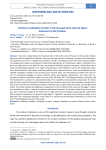
Northern Civilization Corridor in the Eurasian Socio-Cultural Space: Statement of the Problem
Статья научная
The article substantiates the important role of the Arctic zone of Russia in forming and strengthening not only its geopolitical, defense, resource and raw material, economic, transport and communication potential, but also as a significant civilization corridor, providing intensive interaction between different peoples and cultures, which goes far beyond the boundaries of this particular region. Civilization corridors are understood as the basis for the functioning of individual territorial locations, linking them into a living and developing organism of a single humanity due to their fulfillment of the most important migration, communication, information, trade and political socio-cultural functions. There are latitudinal and meridional civilization corridors in the Eurasian socio-cultural space, the intersections of which form the centers of civilizational dialogue of various political, ethnic and religious communities. The three most important latitudinal civilization corridors are the Great Silk Road, the Trans-Siberian Railway (Transsib), and the fundamental conclusion is substantiated about the possibility and exceptional importance for Russia and the whole world of turning the existing Arctic sea transport route into a new civilization corridor that is able to link not only the civilizations of the East and West into a single system of Eurasia, but also North and South. The article analyzes the objective prerequisites for the formation of this new and “youngest” civilization latitudinal corridor, as well as its unifying civilizational functions. The historical role of the Russian people, who united the peoples of the North into a single local Arctic civilization, possessing the civilizational gift of peaceful exploration of space through organic “ingrowth” into other ethno-cultural worlds, is emphasized. The civilizational approach in the unity of its synchronic and diachronic dimensions is used as the main methodological resource of the study.
Бесплатно
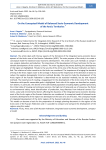
On the Conceptual Model of Balanced Socio-Economic Development of the Arctic Territories
Статья научная
The article deals with the key aspects of the formation of the integrated socio-economic development of the Arctic zone of the Russian Federation (AZRF). The main purpose of the study is to create a conceptual model for balanced socio-economic development. The article uses such methods as comparison, analysis, deduction and induction. The importance of the development of these territories for the sustainable development of the country is shown. The main regulatory documents defining the development of this region are highlighted. Threats to the security of the Arctic zone of the Russian Federation are identified. The relations of other countries to the Arctic are considered. The importance of bringing the standard of living in the Arctic region closer to the average in Russia and the importance of this direction of action to reduce the negative demographic trend are outlined. Besides, the need to study the development of the Arctic region of the Russian Federation is determined not by statistical methods, but by new research methods. The importance of creating a megaproject for the development of the Arctic zone of the Russian Federation with specific measurable goals is highlighted. Such risks of this region are described as: population decline, in particular, the decline of the able-bodied population (including highly qualified personnel), the critical state of housing and communal services, the high cost of living and use of resources, the threat to environmental safety, weak diversification of production, long distances from industrial centers. Economic, social and environmental factors affecting the dynamics of the integrated socio-economic development of the Arctic region of the Russian Federation are considered. A conceptual model of balanced socio-economic development of the region was developed on the basis of a set of factors. The conceptual model of integrated development of the Arctic regions of the Russian Federation is a complex of various factors. This model can become a basis for the preparation of strategic planning documents in the regions of the Arctic zone of the Russian Federation and it is possible to compare and compare the development of the regions using this model.
Бесплатно
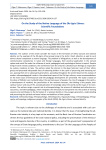
On the Study of the Native Language of the Ob-Ugric Ethnos: Scientific Foundations
Статья научная
The authors of the article consider the issues of the formation of ethno-cultural and national identity on the example of the Ob-Ugric ethnic group living in the Arctic. Much attention is paid to such ethno-cultural component as native language. The problem of bilingualism, as well as the development of communicative competence in native and foreign languages, their practical application in the cultural sphere and social life under the influence of social, pedagogical and psychological factors is topical. Despite living in harsh climatic conditions, the northerners have for centuries cultivated such feelings as responsibility, justice, readiness to help. The authors noted the interest in the deep historical roots of their ethnic group and presented indisputable facts of educating children in the spirit of preserving and increasing values, passing them on to subsequent generations, spreading throughout the world. Based on the analysis of modern ethnopedagogical trends in the educational space of the Ob-Ugric ethnos, some recommendations on the main issues of ethnoculture and folk pedagogy development are presented. The study is based on the ideas of Wilhelm von Humboldt about the spiritual power of people, the role of language in the spiritual development of mankind, the peculiarities of the national character, the thinking of the people, their spiritual nature and way of life, conceptualization of knowledge about the world and the ways of its transmission. The authors assign a special role to ethnopsychology, the science of individual and collective consciousness, and ethnopedagogy, which integrates the ethnocultural component into the system of training sessions and contributes to the formation of a national identity in the younger generation, understanding and preserving the spiritual and moral values and traditions of their people.
Бесплатно
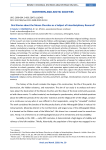
Oral stories about the Mezen churches as a subject of interdisciplinary research
Статья научная
The article analyzes oral narratives about the destruction of Orthodox religious buildings. Sources of the research are tests recorded during the folklore-anthropological expeditions of the Northern (Arctic) Federal University in the Mezen district of the Arkhangelsk Oblast (2009-2018). By the beginning of the 1930s, in Russia, the concept of “militant atheism” took shape and was approved, based on the idea of the counter-revolutionary meaning of religion and the anti-Soviet activities of believers. The object of our research is interdisciplinary. It is the subject of the study for oral history, folklore, social and cultural anthropology, and sociology. The sacrilege narratives are considered not so much as folklore or historical source, but as “a component of a local text ... whose function is not to “reflect”, but to “create” urban history, mythology, set the parameters for local identity.” A metanarrative is represented by the memories of the Mezen residents about the destruction of churches and the persecution of people for religious beliefs. It includes stories with the motives of dropping bells, punishment for the destruction of a church; desecration of cemeteries, the destruction of icons, the salvation of church property by the villagers, the conversion of churches to schools, granaries, clubs or stables, and repression against priests and parishioners. The research allows tracing the dynamics of mass representations. There was a gap in the cultural memory of the Mezen residents. The Mezen religious stories testify that, in the cultural memory of the Mezen, they were supplanted to the periphery and replaced by the Soviet period values.
Бесплатно
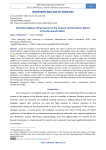
Orthodox Religious Infrastructure in the Tourism and Recreation Sphere of the Murmansk Oblast
Статья научная
Using the example of the Murmansk Oblast, the article analyzes the functioning of religious tourism within a region located in the conditions of the Polar and Subpolar areas. The region is considered as an example of the development of this direction of recreational economy, within which almost all objects of religious infrastructure, acting as the main objects of excursion display on thematic tourist routes, were lost during the Soviet period. A differentiated approach is used to apply the calculated coefficient of territorial concentration in order to identify the features of the placement of functioning monasteries, temples, and chapels. Their high concentration within certain areas of the Murmansk Oblast is recorded. On this basis, as well as on the basis of the analysis of the composition of the main thematic routes offered on the market, the following religious tourism clusters are proposed to be identified — Murman-Kolskiy, Tersko-Beregovoy, and Pechengskiy. The main conclusion of the article is that the role of religious objects in the implementation of educational routes throughout the Murmansk Oblast is significant, and religious tourism within its borders not only operates despite the high dispersion in the placement of monasteries and temples, as well as the losses of the Soviet period, but also has prospects for the introduction of innovative forms.
Бесплатно
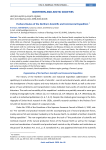
Pechora routes of the Northern scientific and commercial expedition
Статья научная
The article considers the history and the study of the Russian North completed by the Northern scientific and commercial expedition. The main directions of research and the versatility of expeditions in 1920-1924 are reflected. The geological problems that were solved by expeditions to the Arctic territories of the northeastern part of the East European platform, the Timan Ridge, and the northern part of the Ural fold system with its continuing island chain (Vaigach and Novaya Zemlya) are considered. The theoretical conclusions of A.A. Chernov are reflected. The existence of a vast coal basin, the discovery of a great amount of mineral deposits, the mapping of the North of the Urals, and the area near the Pechora are recorded. The results of the described ethnographic research are the first important components in the study of cultural heritage. Despite the multidisciplinary nature and the amount of research carried out in the Arctic, many expeditions were scattered and ineffective; the poor coordination of scientific research that time is also noted by modern researchers of the history of the Arctic development. In 1929, after the reorganization of the Geolkom, on its basis, the Main Geological Exploration Department was formed, and it continued numerous studies of the Pechora region.
Бесплатно
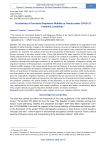
Peculiarities of Territorial Population Mobility in Yakutia under COVID-19 Pandemic Conditions
Статья научная
The article discusses the special characteristics of the territorial mobility of the population of the Republic of Sakha (Yakutia). Changes in the migration situation, structure of migration and migration activity of the population in different social and economic zones of the region in the context of the coronavirus pandemic are analyzed. The analysis shows that the peculiarities of distribution of productive forces and human resources in the labor market retain a fairly high potential for labor migration to the Republic of Sakha (Yakutia) from the CIS countries and far abroad in the context of a pandemic, the share of arriving migrants indicating work among the reasons for migration continues to grow. The influence of socio-economic characteristics and urgent problems of the republic on the formation of migration activity and migration intentions of the population is considered. The article is based on the results of a mass survey in Yakutia (n=200). Analysis of the survey results shows that the features of territorial mobility, migration intentions of the population and absence of migration plans depend on the socio-economic conditions of residence, various factors of individual social status and position, and mobility resources. With mostly satisfactory assessments of the socio-economic situation in the republic and most factors of social life in the region, the respondents’ migration intentions are conditioned by low incomes and territorial specifics — remoteness from the central regions of the country, the high cost of air fares and harsh climatic conditions. In the pandemic conditions, the spatial mobility of the population, as one of the most important social resources of society, is most characteristic of the part of young people who have financial resources, unmarried, seeking better socio-economic and climatic conditions, to regions with better infrastructure, where they can get a decent job, quality education, medical services, recreation and leisure.
Бесплатно
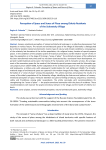
Perception of Space and Sense of Place among Elderly Residents of the Solovetsky Village
Статья научная
Sensory-emotional perception of natural-architectural landscape is a collective phenomenon that depends on various factors. The natural and architectural space of the village of Solovetsky is distinguished by territorial isolation (island environment); marine type of natural and climatic conditions; consequences of the relatively late formation of the civilian population; rich religious history; location of special purpose places. In the conditions of the complex system of historical connections and the relative “youth” of the village, the population is in the stage of forming a “sense of place”. The architectural space of the settlement has been transformed many times and has not been characterised by a consistent linear development. Important transformational events were: the history of the monastery and its monastic services, the arrangement of the monastery space for the needs of the Solovetsky special purpose camp and the Solovetsky special purpose prison (1923–1939), further adaptation of the architectural space for the school of cabin boys and boatswains, a military unit, with subsequent transformation for civil settlement (1944). The transformational stages of architectural space are captured in the modern image of the village, which influences the formation of a “sense of place” among the population. This article examines and analyses the results of a survey of the elderly population of the Solovetsky village, identifying the features and patterns of sensoryemotional perception of space. Particular attention was paid to feelings of beauty, uniqueness, cleanliness, safety and friendliness among older respondents. The article concludes with recommendations for strengthening the “sense of place” — the psycho-emotional connection with the place of residence. These recommendations will improve the psycho-emotional climate in the village and the health of elderly residents.
Бесплатно

